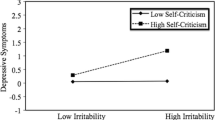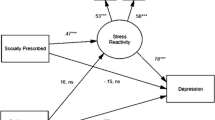Abstract
Diathesis-stress models of cognitive vulnerability to depression posit that personality factors (e.g., self-criticism) interact with congruent negative life events to produce distinct depressive symptom clusters. The present study employed a stress-induction procedure to assess whether self-criticism would interact with achievement-related failure to increase introjective depressive affect in a nonclinical sample. Hypotheses were generally supported with respect to introjective depressive affect reported immediately following the stress-induction procedure. However, self-criticism did not interact with achievement failure in predicting depressive affect reported 24 hours later.
Similar content being viewed by others
References
Allen, N. B., de L. Horne, D. J., & Trinder, J. (1996). Sociotropy, autonomy, and dysphoric emotional responses to specific classes of stress: A psychophysiological evaluation. Journal of Abnormal Psychology, 105, 25–33.
Arieti, S., & Bemporad, J. R. (1980). The psychological organization of depression. American Journal of Psychiatry, 137, 1360–1365.
Bartelstone, J. H., & Trull, T. J. (1995). Personality, life events, and depression. Journal of Personality Assessment, 64, 279–294.
Beck, A. T. (1983). Cognitive therapy of depression: New perspectives. In P. Clayton & J. Barrett (Eds.), Treatment of depression: Old controversies and new approaches (pp. 265–290). New York: Raven Press.
Beck, A. T., Rush, A. J., Shaw, B. F., & Emery, G. (1979). Cognitive therapy of depression. New York: Guilford Press.
Beck, A. T., Steer, R. A., & Garbin, M. G. (1988). Psychometric properties of the Beck Depression Inventory: Twenty-five years of evaluation. Clinical Psychology Review, 8, 77–100.
Blaney, P. H. (2000). Stress and depression: A personality/situation interaction approach. In S. L. Johnson, A. M. Hayes, T. Field, P. McCabe, & N. Schneiderman (Eds.), Stress, coping, and depression (pp. 89–116). Mahwah, NJ: Erlbaum.
Blatt, S. J. (1974). Levels of object representation in anaclitic and introjective depression. Psychoanalytic Study of the Child, 29, 107–157.
Blatt, S. J., D’Afflitti, J. P., & Quinlan, D. M. (1976). Experiences of depression in normal young adults. Journal of Abnormal Psychology, 85, 383–389.
Blatt, S. J., Quinlan, D. M., & Chevron, E. (1990). Empirical investigations of a psychoanalytic theory of depression. In J. Masling (Ed.), Empirical studies of psychoanalytic theory (Vol. 3, pp. 89–147). Hillsdale, NJ: Analytic Press.
Blatt, S. J., Quinlan, D. M., Chevron, E. S., McDonald, C., & Zuroff, D. (1982). Dependency and self-criticism: Psychological dimensions of depression. Journal of Consulting and Clinical Psychology, 50, 113–124.
Blatt, S. J., & Zuroff, D. C. (1992). Interpersonal relatedness and self-definition: Two prototypes for depression. Clinical Psychology Review, 12, 527–562.
Coyne, J. C., & Whiffen, V. E. (1995). Issues in personality as diathesis for depression: The case of sociotropy-dependency and autonomy-self-criticism. Psychological Bulletin, 118, 358–378.
Gruen, R. J., Ehrlich, J., Silva, R., Schweitzer, J. W., & Friedhoff, A. J. (2000). Cognitive factors and stress-induced changes in catecholamine biochemistry. Psychiatry Research, 93, 55–61.
Gruen, R. J., Silva, R., Ehrlich, J., Schweitzer, J. W., & Friedhoff, A. J. (1997). Vulnerability to stress: Self-criticism and stress-induced changes in biochemistry. Journal of Personality, 65, 33–47.
Hammen, C., Marks, T., Mayol, A., & deMayo, R. (1985). Depressive self-schemas, life stress, and vulnerability to depression. Journal of Abnormal Psychology, 94, 308–319.
Helleotes, E., Kutcher, G. S., & Blaney, P. H. (1998). Self-criticism, dependency, and vulnerability to failure and rejection. Unpublished manuscript, University of Miami, Coral Gables, Florida.
Klein, D. N., Harding, K., Taylor, E. B., & Dickstein, S. (1988). Dependency and self-criticism in depression: Evaluation in a clinical population. Journal of Abnormal Psychology, 97, 399–404.
Lakey, B., & Ross, L. T. (1994). Dependency and self-criticism as moderators of interpersonal and achievement stress: The role of initial dysphoria. Cognitive Therapy and Research, 18, 581–599.
Maxwell, S. E., & Delaney, H. D. (1993). Bivariate median splits and spurious statistical significance. Psychological Bulletin, 113, 181–190.
McNair, D. M., Lorr, M., & Droppleman, L. F. (1971). Manual for the profile of mood states. San Diego, CA: Educational and Industrial Testing Services.
Nietzel, M. T., & Harris, M. J. (1990). Relationship of dependency and achievement/autonomy to depression. Clinical Psychology Review, 10, 279–297.
Persons, J. B., Miranda, J., & Perloff, J. M. (1991). Relationships between depressive symptoms and cognitive vulnerabilities of achievement and dependency. Cognitive Therapy and Research, 15, 221–235.
Raven, J. C., Court, J. H., & Raven, J. (1985). Manual for Raven’s Progressive Matrices and Vocabulary Scales. New York: The Psychological Corporation.
Robins, C. J., Hayes, A. M., Block, P., Kramer, R. J., & Villena, M. (1995). Interpersonal and achievement concerns and the depressive vulnerability and symptom specificity hypotheses: A prospective study. Cognitive Therapy and Research, 19, 1–20.
Rude, S. S., & Burnham, B. L. (1993). Do interpersonal and achievement vulnerabilities interact with congruent events to predict depression: Comparison of DEQ, SAS, DAS, and combined scales. Cognitive Therapy and Research, 17, 531–548.
Segal, Z. V., Shaw, B. F., & Vella, D. D. (1989). Life stress and depression: A test of the congruency hypothesis for life event content and depressive subtype. Canadian Journal of Behavioural Science, 21, 389–400.
Segal, Z. V., Shaw, B. F., Vella, D. D., & Katz, R. (1992). Cognitive and life stress predictors of relapse in remitted unipolar depressed patients: Test of the congruency hypothesis. Journal of Abnormal Psychology, 101, 26–36.
Voyer, M., & Cappeliez, P. (2002). Congruency between depressogenic schemas and life events for the prediction of depressive relapse in remitted older patients. Behavioural and Cognitive Psychotherapy, 30, 165–177.
Weissman, A. N., & Beck, A. T. (1978). Development and validation of the Dysfunctional Attitudes Scale: A preliminary investigation. Paper presented at the meeting of the American Education Research Association, Toronto.
Welkowitz, J., Lish, J. D., & Bond, R. N. (1985). The Depressive Experiences Questionnaire: Revision and validation. Journal of Personality Assessment, 49, 89–94.
Zuroff, D. C., Igreja, I., & Mongrain, M. (1990). Dysfunctional attitudes, dependency, and self-criticism as predictors of depressive mood states: A 12-month longitudinal study. Cognitive Therapy and Research, 14, 315–326.
Zuroff, D. C., & Mongrain, M. (1987). Dependency and self-criticism: Vulnerability factors for depressive affective states. Journal of Abnormal Psychology, 96, 14–22.
Author information
Authors and Affiliations
Corresponding author
Rights and permissions
About this article
Cite this article
Mendelson, T., Gruen, R.J. Self-Criticism, Failure, and Depressive Affect: A Test of Personality–Event Congruence and Symptom Specificity. Cogn Ther Res 29, 301–314 (2005). https://doi.org/10.1007/s10608-005-1098-2
Issue Date:
DOI: https://doi.org/10.1007/s10608-005-1098-2




